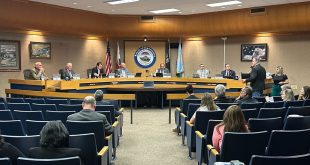
Rep. Juan Vargas Introduces Deported Veterans Bill Package
Preventing veterans from being deported and helping deported veterans get access to medical care
Washington, D.C. (September 21, 2016)—Today, Congressman Juan Vargas (CA-51) introduced a bill package that will prevent veterans from being deported and help veterans that have been deported get access to the medical service they deserve. The “Immigrant Veterans Eligibility Tracking System (I-VETS) Act of 2016” (H.R. 6091), “Healthcare Opportunities for Patriots in Exile (HOPE) Act of 2016” (H.R. 6092), and “Naturalization at Training Sites (NATS) Act of 2016” (H.R. 6093) are part of this legislative package.
“Many immigrants are committed to making the ultimate sacrifice by joining the armed forces,” said Rep. Vargas. “These bills are a necessary step in ensuring that these individuals are well informed on their path to naturalization and that deported veterans have access to healthcare services they need.”
Sadly, many non-citizen service members and veterans are deported every year due to a lack of information and tracking of these individuals. This effectively denies these deported service members the medical care they earned and in many cases require. H.R. 6092 would allow deported veterans the opportunity to temporarily parole back into the United States to seek care from a VA facility.
 “Regardless of immigration status, all U.S. military veterans deserve access to treatment from VA medical facilities,” stated Rep. Vargas. “It’s time that we do something to ensure that all of our veterans, including those that have been deported, are well taken care of.”
“Regardless of immigration status, all U.S. military veterans deserve access to treatment from VA medical facilities,” stated Rep. Vargas. “It’s time that we do something to ensure that all of our veterans, including those that have been deported, are well taken care of.”
Many foreign-born soldiers enlist in the military under the belief that military service will automatically make them U.S. citizens. Unfortunately, the federal government does not adequately inform them of the necessary steps for naturalization. H.R. 6093 aims to provide naturalization services at training sites.
Currently, neither the Department of Defense, nor the Department of Homeland Security, track the progress of service members and veterans’ immigration status. H.R. 6091 will establish an immigrant veteran’s eligibility tracking system.
About H.R. 6091 – I-VETS Act of 2016
- The Immigrant Veterans Eligibility Tracking System (I-VETS) Act of 2016 helps identify active and retired non-citizen servicemembers. The bill directs the Secretary of Homeland Security to identify non-citizens who have served in the armed forces when applying for immigration benefits or when placed in immigration enforcement proceedings. This information will enable DHS to “fast track” veterans and service members who are applying for naturalization, while also allowing officials to practice prosecutorial discretion, if appropriate, when adjudicating their cases.
About H.R. 6092 – HOPE Act of 2016
- The Healthcare Opportunities for Patriots in Exile (HOPE) Act of 2016 will allow deported veterans the opportunity to temporarily parole back into the United States to seek care from a VA facility. The bill amends section 212 (d)(5) of the Immigration and Nationality Act accordingly to give the Secretary of Homeland Security the discretion to temporarily parole deported veterans into the U.S. on a case by case basis to seek healthcare then return home.
About H.R. 6093 – NATS Act of 2016
- The Naturalization at Training Sites (NATS) Act of 2016 ensures that non-citizen servicemembers are well informed of the naturalization options available to them. The bill will (1) direct each branch of the Armed Forces to establish a naturalization office at their initial training sites; (2) instruct the Secretary of Defense to identify and contact non-citizen service members and inform them of their options; (3) require the Department of Defense (DOD) to retain trained staff at the established naturalization offices; and (4) encourage the Secretary to assign non-citizen recruits to training sites with operating naturalization offices pending the completion of said offices at all training sites.
Rep. Vargas represents California’s 51st Congressional District which includes the southern portion of San Diego County, all of Imperial County and California’s entire US/Mexico border. Vargas was first elected to the U.S. House of Representatives in 2012 and is currently serving his second term in Congress. He represented the 40th California State Senate District from 2010-2012, the 79th California State Assembly District from 2000-2006 and served on the San Diego City Council from 1993-2000.





